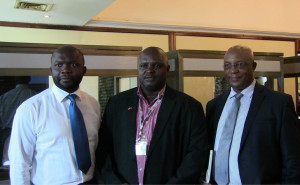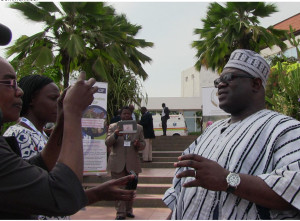Accra, Ghana, march 10 2016 – Accelerating agricultural transformation is at the core of the 2nd Comprehensive Africa Agriculture Development Programme (CAADP)[1]
Permanent Secretaries Leadership Retreat, convened by the African Union Commission in collaboration with the NEPAD Agency in Ghana. The 2nd Retreat, aimed at accelerating the implementation of the CAADP to transform agriculture in Africa, brought together over 100 participants – Permanent Secretaries and CAADP Focal persons of Ministries of Agriculture, Rural Development, Livestock and Aquaculture and the Regional Economic Communities.

Ph/DR-: L to R: Dr Augustin Wambo Yamdjeu (Head of CAADP); Hon. Patrick Worzie (Assistant Minister for Planning & Development in Ministry of Agriculture – Liberia); Mr Martin Bwalya (Head of Programme Development)
In his opening remarks, the Ghanaian Minister for Food and Agriculture, Mohammed-Munira Limuna (Alhaji) declared that even though the agricultural sector is faced with numerous challenges such as low uptake of modern technologies, depleting natural resources especially water and climate change negative impacts, solutions that can be adopted to counter them at national level should be sought and implemented.
The Retreat provides space for Permanent Secretaries (as the authorities responsible for coordinating and facilitating implementation of CAADP and ensuring delivery on its value addition to national agricultural transformation) to reflect on the following thematic and policy factors:
- El Nino and implications on agricultural transformation and food security;
- Trade and industrialisation drive and implications for agriculture; and
- Land tenure systems and trends and implications for the Malabo commitments
The meeting also focused on validating the revised Country CAADP Implementation Guidelines. This includes modalities for monitoring and evaluation, reporting and accountability including operationalisation of the African Union Biennial CAADP Review Cycle. Country perspectives were also sought on CAADP-Malabo Financing Architecture; technical networks arrangement to mobilise and make accessible expert support arrangements, and; revising the CAADP partnership architecture.

Ph/DR-: Hon. Mohammed-Munira Limuna (Alhaji) Minister for Food & Agriculture in Ghana talking to the media
The Comprehensive Africa Agriculture Development (CAADP) is an African-wide agenda designed to pport the transformation of the continent’s agriculture for sustained food security and socio-economic growth. The CAADP Malabo Declaration is a commitment by member states in 2014 to implement a number of essential policy reforms toward ending hunger and cutting poverty in Africa in half by 2025. To meet these goals, African leaders re-affirmed their intention to devote 10% of their national budgets to agricultural development and agreed to targets such as doubling agricultural productivity, halving post-harvest loss, and bringing stunting down to 10% across Africa.
Also speaking at the event, Martin Bwalya, NEPAD’s Head of Programme Development, pointed out that the outcomes of the meeting will clarify the necessary measures needed to achieve the CAADP Malabo Declaration targets for results and impact in agriculture, food security and nutrition.
Dr. Janet Edeme, AUC Director for Rural Economy and Agriculture reiterated one of the critical objectives of meeting as being “The review of progress in implementing CAADP and the guidelines developed to help guide countries in implementation.”
Permanent Secretaries are the primary custodians of government policy and practice. They are also the overall accounting officers in their government ministries. This puts their offices and mandates at the centre in driving institutional reforms and overall transformation in national development goals.
Malabo Declaration’s emphasis on implementation and delivering results and impact, implies critical attention to reforms in economic and development policies and institutions to enhance capacity and ability to design and implement, in this case, agricultural transformation programmes. Sustained agriculture transformation is unlikely without pro-active leadership and involvement of primarily the Ministry of Agriculture Permanent Secretaries.
Even though the primary focus is on Permanent Sectaries in Ministries of Agriculture, the multi-sectoriality of Agriculture makes it essential that other Permanent Secretaries in Agriculture-related Ministries including Planning, Finance and Economic Development also attend the meeting for input to galvanise national action necessary to domesticate and operationalise the Malabo commitments and the CAADP Results Framework.
Source: NEPAD Agency
 www.l-integration.com – L'INTEGRATION – Actualité L-integration journal actualité bénin monde afrique ligne intégration
www.l-integration.com – L'INTEGRATION – Actualité L-integration journal actualité bénin monde afrique ligne intégration




